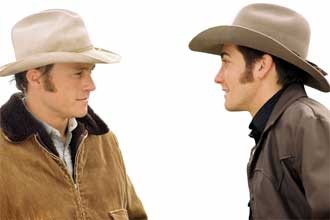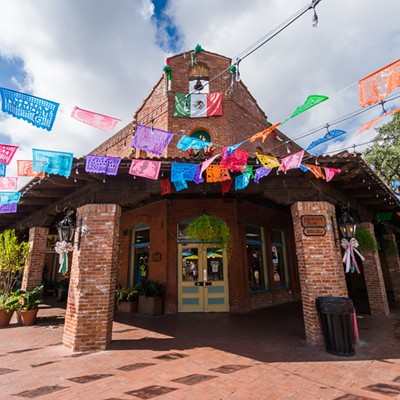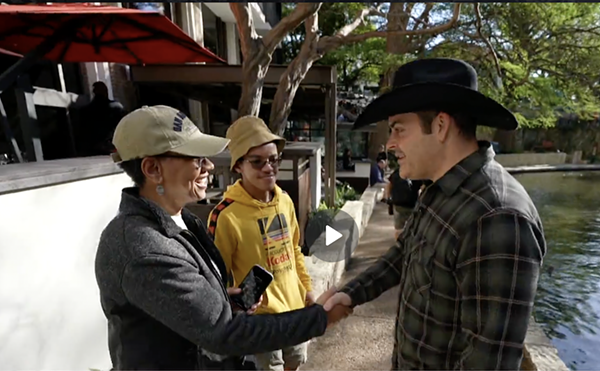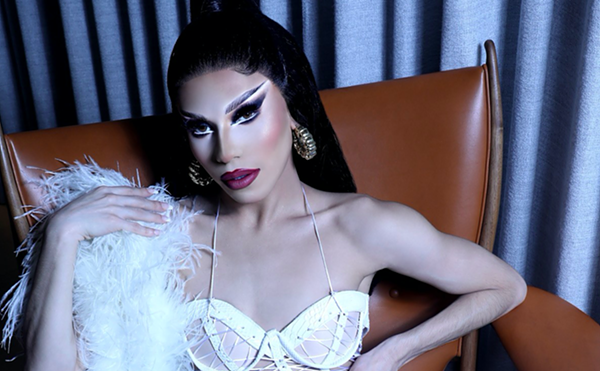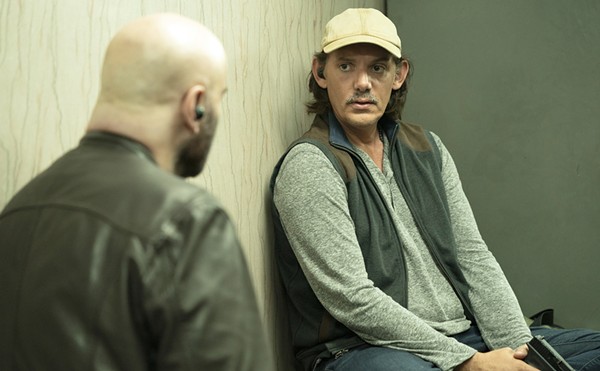Ang Lee and Jake Gyllenhaal talk about the need to bare all in Brokeback Mountain
“Heath did, I think, but not me,” Jake Gyllenhaal jokes when asked if he had to down a few shots of vodka to prepare for the rambunctious, homosexual sex scene he shares with Heath Ledger in this winter’s Brokeback Mountain — aka “that gay cowboy movie.”
The scene takes place near the end of the film’s protracted first act. Gyllenhaal’s loudmouthed Jack Twist and Ledger’s lonesome, zip-lipped Ennis del Mar find themselves atop Brokeback Mountain, a fictional Wyoming location Pulitzer Prize-winning author E. Annie Proulx created in her same-titled short story as a haven for two summer sheepherders to fall in love on and, over the course of 20 years, return to time and again to re-tap that love. It’s 1963 and if homosexuality is a taboo reality in the nation’s more cosmopolitan metropolises, then it’s downright forbidden in what remains of the dying West. That reality slows the relationship that is inevitable from the opening scene when Jack and Ennis first encounter each other, but it can’t prevent it.
Drunk and freezing, the two cowboys find themselves in the same tent as snow-fat clouds lurk overhead. Half asleep but still conscious enough, Jack drapes sleeping Ennis’s arm across him. When Ennis wakes, though, he panics and, as he always does, reacts angrily by striking out. Jack, unwilling to relent, fights back.
“It’s a choreography,” Gyllenhall explains of Academy Award-nominated director Ang Lee’s construction of the scene. “Just like in Crouching Tiger, Hidden Dragon where the fight scenes were like love scenes. It seems to be harder for everyone to go, ‘Oh, the love scenes in `Brokeback` are like fight scenes,’ but, for us, we were choreographing a fight scene.”
Ennis can’t surrender his Western masculinity and afterward he insists, “You know I ain’t queer.” Jack, a natural liar (a state we come to realize all closeted homosexuals must embrace), answers, “Me either.” That’s certainly not the case in that first liaison, though. After rough, even violent kissing, Jack spins around onto all fours, jeans unbuckled and yanked halfway down. While you believe in Ennis’ virginity when in an earlier scene he tells Jack, “You might be a sinner, but I ain’t yet had the opportunity,” there’s little doubt Jack knows what he’s doing. There’s also little doubt that the two are falling in love.
But this is the kind of love story that 20 years ago — hell, 10 years ago — could’ve ended the careers of A-list male actors rather than earning them some of the best press of their career. Just try to find a magazine rack this month that doesn’t display at least three covers with Gyllenhaal sporting his big, gosh-golly-aw-shucks smile. Ledger’s mug has been a little less pervasive, but, then again, his Brokeback co-star and real-life fiancée Michelle Williams just gave birth to their first child; the Australian-born actor has been a wee preoccupied.
Ang Lee offers little sympathy for his young wards and the risk they accepted in playing such controversial roles. “That’s not really my problem; I didn’t really care,” he admits. “They’re good actors and they want to do good work, so when they see a juicy part they get excited. These guys are like that.”
Before the film even debuted at the Venice International Film Festival (where it won the coveted Golden Lion for Best Picture), rumors began to circulate that Lee had decided to edit the love scene into an ultra-softcore encounter that would only rankle über-hardcore conservative groups — some even said he intended to cut out any lip locking, but Lee dismisses such allegations, as do his actors.
| But this is the kind of love story that 20 years ago — hell, 10 years ago — could’ve ended the careers of A-list male actors rather than earning them some of the best press of their career. |
“If this was a heterosexual relationship, you wouldn’t need to see more,” he says. “But here, you have to show it to some degree because people aren’t familiar with it.” Moreover, “The characters didn’t have the vocabulary at that time to understand their experience. It was very private; their bodies, their emotions — how you psychologically establish that. So being gay is very important to this.
“I don’t mind when it’s called a gay western,” he adds, smiling devilishly, “except marketing-wise that’s like a poison. At the theatrical conventions, people would think it was a comedy like Blazing Saddles or something.”
But alas, sex isn’t what Brokeback Mountain is about. It’s a love story, and one far more convincing and honest than most everything Hollywood doles out to us these days. “Brokeback Mountain to me is the illusion of love. It’s confusion,” Lee goes on to explain. “When they’re inside, they don’t know what happens and they spend 20 years trying to go back. The act itself is just very interesting to me.”
Those two decades constitute the rest of the film, from the moment Ennis gets off the mountain and marries his sweetheart Alma (Williams) to Jack’s marriage to rich rodeo darling Lureen (Anne Hathaway), to the children and divorce, to the heartache that defines Jack’s and Ennis’ lives as much as the love they share. It is, as Lee puts it, the great American love story. Well ... sort of.
| Brokeback Mountain Dir. Ang Lee; writ. Larry McMurtry, based on a short story by E. Annie Proulx; feat. Heath Ledger, Jake Gyllenhaal, Randy Quaid, Anne Hathaway, Michelle Williams (R) |
Gyllenhaal sees it the same way. “You’re supposed to get the girl, you’re supposed to lose the girl, you’re supposed to get the girl again. When you get the girl again, it’s all good. Yeah, sometimes we talk about waking up the next morning and you’re brushing your teeth together, but we don’t usually talk about that in movies. When we do, it’s with a guy and a girl and we know that. But this was like putting it in an environment where we’ve never seen it before.”
It’s not difficult to imagine that Brokeback Mountain’s environment involves repression — a theme that permeated Lee’s The Wedding Banquet, Pride and Prejudice, and The Ice Storm. “I like the repression. I’m a nice guy, so I’m repressed,” he laughs.
Homosexuality explored in the context of Wyoming in the ’60s and ’70s is the most overt use of that theme Lee has employed. The result is his most emotionally powerful film to date, one that will not only test the volume of tears the human body can produce in just over two hours but also the willingness of mainstream America — polarized as it currently is by the so-called Culture War — to embrace a film about love. Even if it is between two men.
“I hope that everyone sees the movie, even small towns in the conservative parts of the nation,” Lee says. “When they see a love story, there’s got to be sensitive people. So I cannot say that in a small town they’re oblivious to the issues I’m dealing with. We’ll see how it plays out.” •
By Cole Haddon

